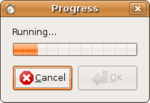appImage (packaging method)
Lua error in package.lua at line 80: module 'strict' not found.
| 64px | |
| Developer(s) | Simon Peter |
|---|---|
| Initial release | 2013 |
| Development status | Active |
| Written in | Python |
| Operating system | Linux |
| Type | Software download system / package format |
| License | MIT License |
| Website | appimage |

klik installing an application
|
|
| Developer(s) | Simon Peter |
|---|---|
| Stable release | 0.5r9 / June 7, 2006 |
| Development status | Discontinued / unmaintained |
| Written in | Python |
| Operating system | Linux |
| Type | Software download system |
| License | GPL (client) |
| Website | klik.atekon.de (archived 2007) |
AppImage, originally called klik, is a system for using portable software on Linux without needing superuser permissions to install the application.[1] It tries also to allow Linux distribution-agnostic binary software deployment for application developers.[2] Released first in 2006, it was continuously developed since then, renamed in 2011 to PortableLinuxApps and 2013 to AppImage.
Contents
Technology
AppImage, like the predecessors klik and portablelinuxapps, do not install software in the traditional sense; i.e., it does not put files all over the place in the file system. It uses one file per application. Each one is self-contained: it includes all libraries the application depends on and that are not part of the base system. In this regard, it is similar to "application virtualization". One can use an AppImage file even if they are not a superuser, or they are using a live CD. AppImage files are often simpler than compiling and installing an application, as no installation actually took place. The AppImage file is a compressed image which is temporarily mounted to allow access to the program, but not having to extract the program or modify the underlying system.
klik
klik integrated with web browsers on the user's computer. Users downloaded and installed software by typing a URL beginning with klik://. This downloaded a klik "recipe" file, which was used to generate the .cmg file. In this way, one recipe could be used to supply packages to a wide variety of platforms. With klik only eight programs can be run at once because of the limitation of mounting compressed images with the Linux kernel, unless FUSE is used. The file is remounted each time the program is run, meaning the user can remove the program by simply deleting the .cmg file.
History
AppImage's predecessor klik was designed in 2004 by Simon Peter.[3] A next version, klik2, was in development; and would natively incorporate the FUSE kernel module, but it never reached past the beta stage. Since 2011 the project homepage klik.atekon.de was not reachable anymore. Instead the successor project named PortableLinuxApps with similar goals was started by Simon Peter.[2]
Around 2013 the software was renamed again from portableLinuxApps to AppImage. AppImage is the format and AppImageKit is a concrete open source implementation. The development happens in a GitHub repository with latest changes from 2016.[4]
Reception and usage
Linus Torvalds' dive log application Subsurface started to use AppImage around 2015. Subsurface's traditional packaging was changed to a portable, self-contained, distro-agnostic AppImage as binary software deployment for the Linux users of the various Linux distributions turned out to be problematic.[5][6][7]
MuseScore started in April 2016 to use AppImage builds for software deployment for all Linux flavors.[8]
See also
- Portable application creators
- Autopackage
- RUNZ, also follows the "one file per application" philosophy
- Zero Install, another similar project
- ROX uses directories (AppDirs) as application bundles.
References
- ↑ Lua error in package.lua at line 80: module 'strict' not found.
- ↑ 2.0 2.1 Lua error in package.lua at line 80: module 'strict' not found.
- ↑ Lua error in package.lua at line 80: module 'strict' not found.
- ↑ Lua error in package.lua at line 80: module 'strict' not found.
- ↑ Lua error in package.lua at line 80: module 'strict' not found.
- ↑ Lua error in package.lua at line 80: module 'strict' not found.
- ↑ Lua error in package.lua at line 80: module 'strict' not found.
- ↑ Lua error in package.lua at line 80: module 'strict' not found.
External links
- appimage.org Official AppImage page
- portablelinuxapps.org successor project on SourceForge (accessed August 2, 2011)
- klik.atekon.de Official klik site (archived)
- English articles listed in klik Wiki[dead link]
- klik client repository page at Google Code